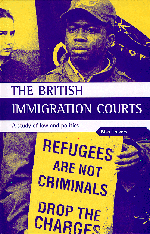

![]()
![]()

New and insightful material is presented through analysis of the process of appeals. Six case studies of primary purpose appeals are used to show how adjudicators decided on the genuineness of an arranged marriage. A frequent argument, made by Entry Clearance Officers, was that where there had been a 'breach of cultural tradition' then this indicated that the primary purpose was to gain entry to the UK. This theme, that advocates of restrictive controls were also advocates of maintaining strong cultural traditions, is noted as a wider feature of immigration debates. The paradox and opportunity that such restrictive controls also provided for women in the UK who sought to resist arranged marriage is also highlighted. This issue arose when the adjudicator asked the sponsor if they were happy to enter into the arranged marriage and Travers found that in some cases women handed in notes asking the court to refuse the appeal. This indication of judicial sympathy is allied to the cultural prejudice held by adjudicators against arranged marriage which is exemplified. In examining the question of whether there was a 'culture of refusal' in primary purpose appeals, he charts the rise of refusals form 4% (1977) to a high point of 47% in 1984 and a subsequent decline to 20% in 1995 as it was acknowledged that the rule 'was on its way out'.
A parallel set of six case studies and questions relating to decision-making and refusals are used to examine asylum appeals. Here, the majority of asylum appeals were found to be refused of grounds of credibility often prior to and irrespective of the question of assessing the risk of persecution if the person returned to their country of nationality. The norms of the 'occupational community' of the courtroom were to become 'case-hardened' to 'evidentially -weak' cases. Travers cites the example of Indian appellants who made up about 17% of appeals all of whom were unsuccessful where there was seen to be little risk of persecution. But, as a result the majority of appeals from people coming from countries with strong evidence of persecution but with doubts raised over their individual story are still refused e.g. Turkey, Sri Lanka, Croatia and Sudan. Here the cynicism of Presenting Officers about asylum-seekers claims is contrasted with the sympathy of adjudicators who are unable to allow more than a small number of appeals in the face of criticisms of the 'refusal culture' by the IAS and the Refugee Legal centre. The reduction of the question of asylum and immigration policy to the administrative problem of the appeals backlog, and the lack of public and political interest in the issue is carefully charted. Finally, Travers delivers his verdict that political rhetoric has failed to deliver effective control and will continue to do so in the future. This valuable and provocative book both deserves and repays careful attention.
Ian Law
University of Leeds